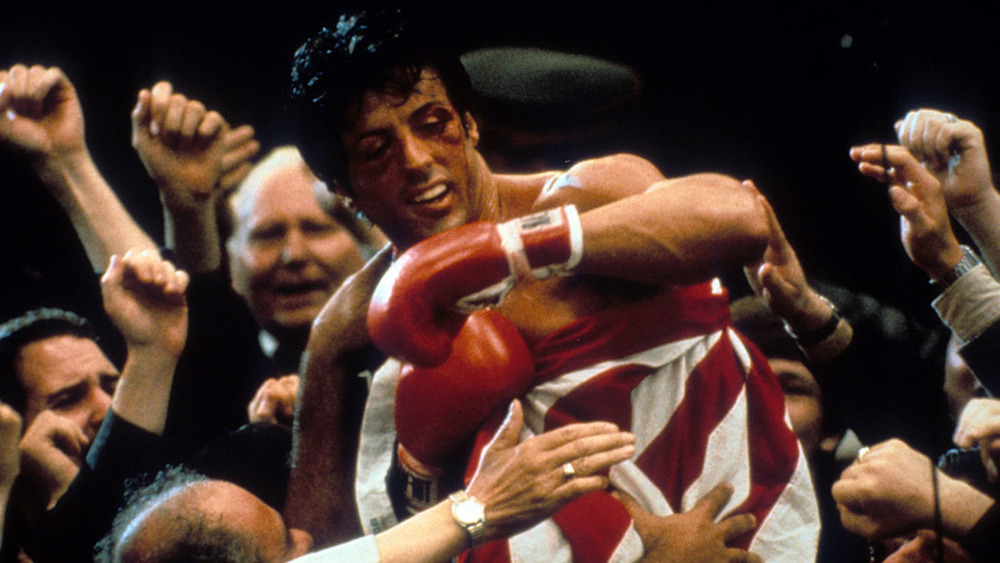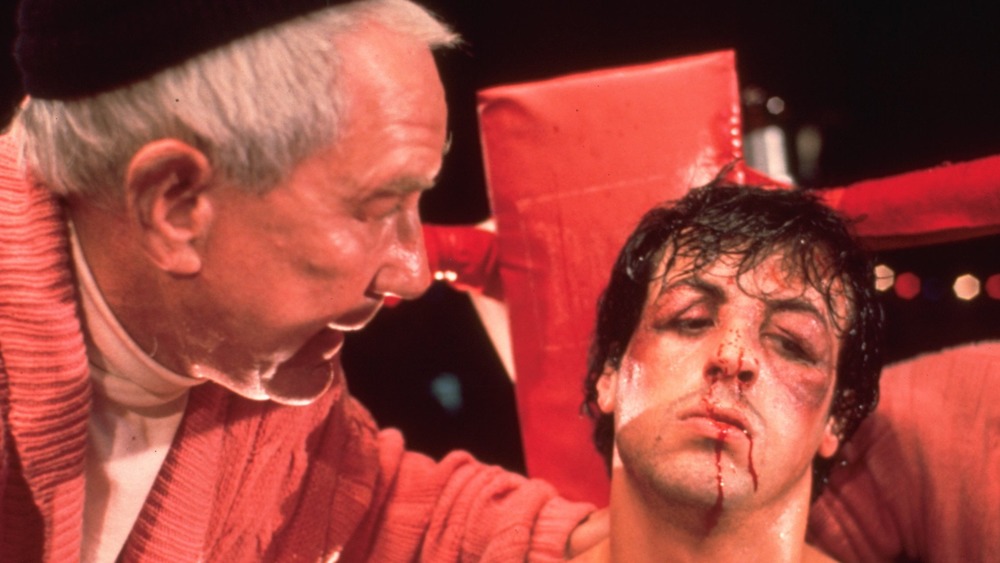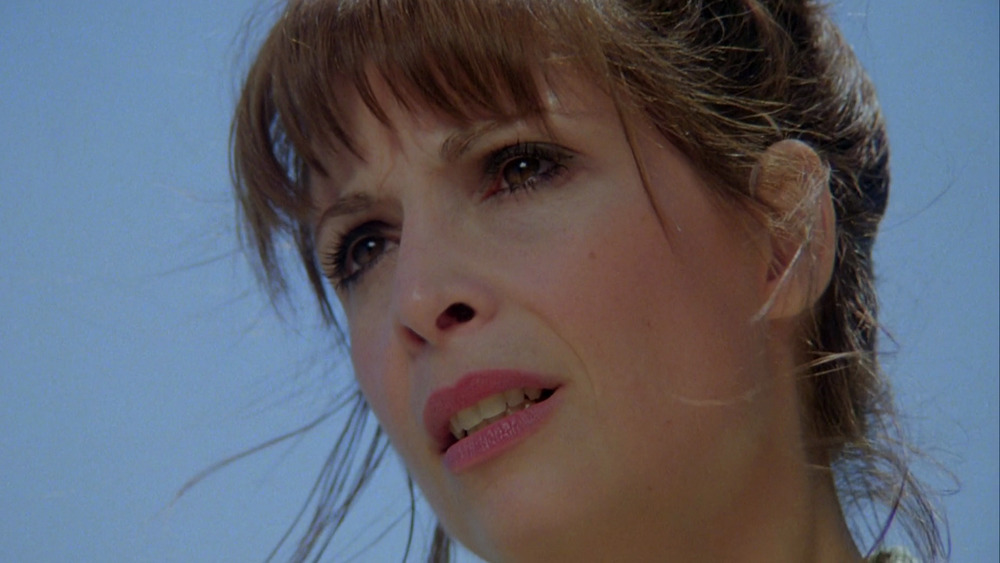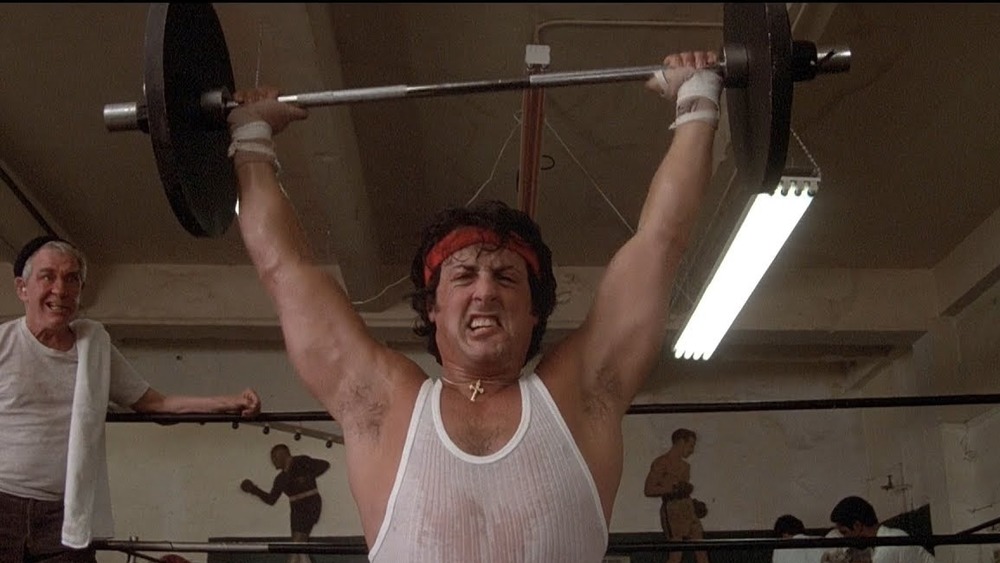Rules Rocky Balboa Has To Follow In Every Movie
There are few more beloved poster children for the down and out, for the street kid hoping for better, and for the underestimated underdog than Rocky Balboa (Sylvester Stallone). Since 1976, Stallone has starred (and almost always written) every single Rocky and Creed movie. Whether he's living in the slums of Philadelphia or in a mansion with a robot maid (until the "no robot maid" edit of Rocky IV, that is), Rocky is an iconic people's champion who, win or lose, inspires everyone around him. And, as is the case with many mythic heroes, Rocky has a way of doing things. He has a code that plays a significant part in what makes him so aspirational, so relatable, and so easy to root for.
By the same token, the Rocky movies have a winning formula and set of criteria that apply to each installment in the franchise. Clearly something is working. It's not just that Rocky is loved by people within his own stories, even in the real world people adore him. There's a statue dedicated to the character, standing at the top of those 72 stone steps leading to the Philadelphia Museum of Art — even those steps are called "Rocky Steps." With over $1.5 billion in box office receipts (via The Numbers), it's undeniable — the Rocky formula works. So let's take a look at the rules that Rocky follows in every movie.
Rocky never does it just for himself
There is a reason why Apollo Creed (Carl Weathers) is not considered the hero of the first two Rocky films — he's portrayed as a glory hound. A people's champion is not focused on ego or hubris. Sure, some part of you has to want to be the best to become the heavyweight champion of the world, but the whole point of Rocky's story is that he fights in the ring because he's got to keep the lights on and he's got other people who rely on him. In the original Rocky, Balboa wants to make enough money so he can be the sort of man Adrian (Talia Shire) needs in a husband. Rocky is fighting for love. And the same holds true in Rocky II, when he tirelessly waits by Adrian's hospital bed until she wakes up after giving birth to their son. It's only when Adrian instructs Rocky to "win" that he can do it because a big part of him is doing it for her. In Rocky III, he beats Clubber Lang (Mr. T) in part to do right by Mickey (Burgess Meredith); in Rocky IV he beats Ivan Drago (Dolph Lundgren) after Drago kills Apollo; and in Rocky V, he stands up for the sanctity of the sport which has defined so much of his identity.
In 2006's Rocky Balboa, Rocky returns to the ring in part because it's still the one thing he can do to help inspire others. And, of course, in the Creed movies, Rocky becomes Adonis Creed's (Michael B Jordan) coach because he knows how hard the life of an athlete is and he knows he owes it to Apollo to help his late friend's son navigate the shark-infested waters of professional boxing. Rocky famously says, "It ain't about how hard you hit, it's about how hard you can get hit and keep moving forward." Rocky takes those hits so others don't have to.
Rocky can't do it alone
It may physically just be Rocky and his opponent in the ring, but, in reality, Rocky could never win a single fight on his own. We learn that right from the start, Mickey identifies Rocky as a "tomato" because Rocky hasn't thrown himself into the fight in the beginning. It's Mickey who reminds Rocky that you can't play it safe if you want to win. He has to be willing to really take a punch if he wants to be a contender. And, again, Rocky couldn't beat Apollo in Rocky II until Adrian says "win," nor could he have taken on Clubber Lang without training from Apollo Creed. Rocky feels utterly isolated when he comes to Russia to fight Drago. It's not until Adrian shows up and promises she'll be with him no matter what that Rocky finds the fight in him again after losing his friend Apollo.
Similarly, in Rocky Balboa it's not until Rocky Jr. agrees to be in Rocky's corner when he fights Mason Dixon (Antonio Tarver) that Rocky has any shot at going toe-to-toe with a much younger champion. And Rocky needs people more than ever when the Creed movies come along. As Rocky gets older and sicker he needs a reason to live, a reason to believe he should even want to keep living at all, and that reason is Adonis Creed. Donnie gives Rocky another shot to be a good (surrogate) father and that meaning drives Rocky to hang on to life. In short: the world needs Rocky as a symbol but Rocky needs to world just as much.
Rocky always talks things over with Adrian
There are a lot of people on whom Rocky relies throughout his film franchise, but no one more so than his wife, Adrian. In addition to her impact on him in Rocky II and Rocky IV, there's the beach scene from Rocky III, one of the most quintessential, defining conversations Rocky and Adrian have, typifying what makes their marriage great. At this point in the story, Rocky has lost Mickey, he's gotten out-slugged in no time flat by Clubber Lang, and now his confidence is gone, too. And as much as Apollo can prepare Rocky's body and adjust his technique, there's only one person who can strengthen his heart: Adrian.
So when he's on the beach and ready to give it all up, Adrian forces Rocky to admit that he's afraid and that he doesn't want to lose what he's got. Most of all, she forces him to confront that fighting Clubber Lang can't only be about Apollo, Mickey, or the lifestyle he wants to maintain for his family. "You gotta want to do it for the right reasons," she says. "Not for the guilt over Mickey, not for the people, not for the title, not for money or me, but for you. Just you. Just you alone." "How'd you get so tough?" Rocky asks. "I live with a fighter," she answers. They make each other strong. It's an incredibly powerful relationship, so strong, in fact, that even after Adrian dies, Rocky continues to visit her grave in every subsequent film to talk with her about the world and his life. Because even when Adrian isn't physically present, Rocky still finds his strength in her.
There has to be at least one training montage
In both what it does for the character and what it means for the film, there is one thing that Rocky requires to come out on top: a training montage. There is a point in every Rocky movie, the transitional point at which whatever internal conflict is holding him back is overcome and the real work begins. Whether it's fighting with chickens, running through the streets of Philadelphia, building hurtin' bombs, or climbing a snowy mountaintop in Russia, Rocky's greatest enemy is often himself. And he defeats his own anxieties and limitations through the power of montage, and you can't have a training montage without an epic, inspirational song. Bill Conti's original Rocky theme, "Gonna Fly Now" is the stuff of legends, but imagine putting together a playlist for hitting the gym without including Rocky III's anthem, "Eye of the Tiger" by Survivor. You can't. It would be madness.
Every Rocky movie has a training montage. Rocky IV is calculated as being 31.9% montage. Even when Rocky isn't the one training, there's still a montage. In Rocky V, Tommy Gunn (Tommy Morrison) gets a montage. And, naturally, Adonis Creed gets training montages in Creed and Creed II with Rocky by his side. A Rocky movie simply wouldn't be a Rocky movie without a training montage, which might make their inclusion the most important rule in the entire franchise.




